Pet owners love their animals and will do anything to keep them safe and healthy. But even in extreme temperatures, you don’t have to choose between keeping your pet comfortable and minimizing your energy costs.
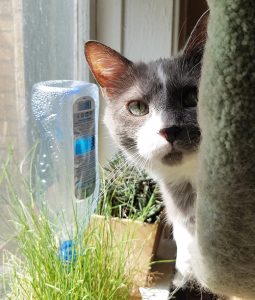 Charlie Charlie’s human: Deputy Director Kristin |
Use a programmable or smart thermostat. Don’t be afraid to set your thermostat a little higher in the summer or lower in the winter while you’re away from home. In winter, cats and dogs do not necessarily need extra heating, and in the summer they have ways of dealing with warm temperatures (think panting) that humans don’t.
The Alliance to Save Energy recommends pet owners set the thermostat to 68 degrees in the winter and 78 degrees in the summer, but check with your vet to see what temperature range is best for your particular breed or species. |
 Thisbe Thisbe’s human: Director of Research Jeff |
Shield your pet from areas of extreme temperature. Place your pet beds, cages, and aquariums in areas not subject to big temperature swings—away from air conditioning systems and drafty windows and doors. Seal windows and doors around your pet’s main habitat to create the perfect climate for them without running up your power usage.
Make sure your indoor pet has at least one warm place to sleep. (This can be as simple as a pet bed with a blanket.) Consider providing a few sleeping options in different temperature zones so your pet can adjust his comfort as needed. Don’t use electric blankets or other products designed for people. They can often get too hot and may not be as resistant to punctures from pets’ claws. Short-snout dog breeds like bulldogs and short-faced cats like Persians are more likely to suffer from heatstroke. Provide plenty of water (add ice if you wish) and cool treats. Provide cool areas to rest such as a basement or a tile floor with a cooling mat. Small pets like bunnies and reptiles are also vulnerable to extreme temperatures. Give them plenty of water, provide shade, and turn off supplemental heating when it’s hot out. |
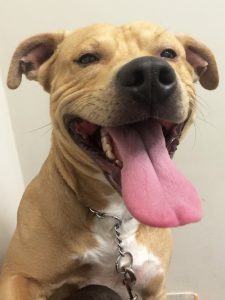 Wilson Wilson’s human: Office Assistant Brie |
Keep your AC in top working order. A build-up of dust or debris could force your cooling equipment to work harder, leading to high utility bills and more wear and tear. Be sure to change your air filter regularly.
Give your cats and dogs loving attention too: Consider scheduling an appointment with the groomer. Brushing and bathing more often will reduce shedding and eliminate pet hair and dander from your home. |
 Tom Tom’s human: Managing Outreach Director Sarah |
Shut off fans. Animals don’t produce sweat the way humans do, and fur coats might prevent them from feeling the breeze produced by your fan. Running the fan when you aren’t at home won’t change the temperature of your home or your pet—it’ll just add unnecessary kilowatt-hours to your electric bill.
Instead, provide cool areas to rest, such as a basement or a tile floor with a wet towel for your dog to lie on. Dogs and cats do not have sweat glands. Make sure they have plenty of cold water to drink. |
 Maurice Maurice’s human: Executive Director David |
Don’t leave lights on. Most pets rely on natural light and darkness for their internal schedules and don’t need artificial light. One product CUB often recommends to save on lighting costs—motion sensors—will pick up animal motion as well, so these lights won’t work quite as well for you, especially if you have a particularly active cat or dog. |
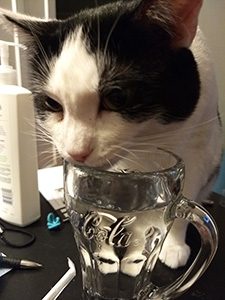
Pixie |
Make a schedule for pets that need supplemental lighting, and use energy-efficient bulbs. Exotic pets—like reptiles, amphibians, fish and some birds—may require additional lighting during the day. The easiest way to provide the correct amount of light is to buy a timer from a hardware or pet store. This keeps your reptile on its optimal schedule, and helps you manage energy costs by automatically switching light and heat lamps on and off.
Pets that need extra light require full-spectrum bulbs. Those are bulbs that replicate natural sunlight, including ultra-violet light and UVB in particular, for bodily functions such as vitamin D synthesis. Full-spectrum compact fluorescent light bulbs, which are energy efficient and supply UVB light, can be found at pet stores. |
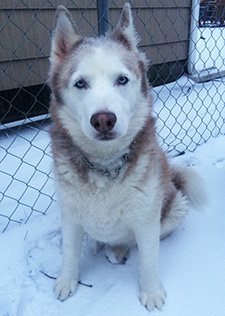
Suzy |
Install an energy-efficient pet door. If your doggie door is not air tight, it can suck cool air (in the summer) and warm air (in the winter) right out of your home, along with your hard-earned money. Caulk the frame of your pet door to prevent air leaks, and apply magnets to the flaps to secure them in high wind. Also consider upgrading to a more energy-efficient model, such as one with triple plastic flaps and built-in magnets. |
 Cora Cora’s human: Deputy Director Kristin |
Turn off the TV. Leaving televisions and radios on when you’re not home will only confuse your pet and prevent it from napping. Toys and bones are much better entertainment, and they won’t cost a dime on your power bill. It’s far better to leave your pet with clothing that smells like you, a play toy with a treat hidden inside, or even hide some treats around the house, for example in a cardboard box full of scrunched up paper.
If you are worried about your pets’ behavior when left alone, ask your vet to recommend a qualified animal behaviorist. |
 A.C. A.C.’s human: Executive Director David |
Recycle aquarium water. When you clean your fish tank, remove only one-third or one-half of the water and use it to water indoor and outdoor plants. Pumps and filters with lower power consumption will cut down on your electric bill. Keeping your tank clean will also help it run more efficiently. Since a filtering fish tank is always running and using energy, make sure yours is as efficient as possible and uses LED lights. |
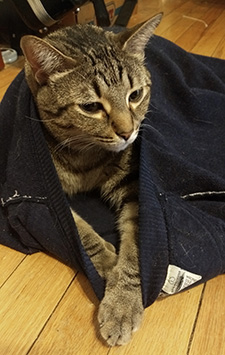 Moxie Moxie’s human: Project Coordinator Hilary |
Wash pet fabrics in cold water. If your dog’s blanket or your cat’s favorite sweater needs a wash, use cold water instead of hot. The fabric will come out just as clean, you’ll use up to 90 percent less energy, and Fluffy won’t know the difference. |
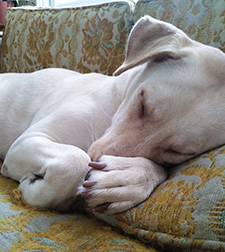 Nilla Nilla’s human: Digital Communications Coordinator Megan |
Don’t run the tap. Make sure your pet has plenty of water available—in a dish—before you leave home. Some cats may be finicky about drinking from a bowl so a cat fountain is a great way to encourage them to stay hydrated. Pet stores sell gravity-run drinking fountains that provide the fresh running water your pet likes without the power suck of a pump. |
 Clarence Clarence’s human: Managing Communications Director Jim |
Treat sunny windows. The sun’s glare can affect the indoor temperature in your home, leading your cooling system to switch on more frequently. Consider treating your windows with solar film, which reduces glare, or close most of the blinds and drapes to filter the light that can increase indoor temperatures. And don’t forget to keep your windows screened! You want to let cool air into the house without your pet jumping out!
In the winter, open the blinds/drapes to let the sun help warm the house, and close them at night to block the chilly wind. Got other tips to add? Post a comment! |

